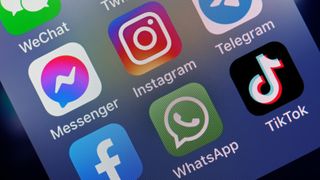Is Facebook safe for kids – no, in a word. While the social media giant may not be as popular with kids today as TikTok or YouTube, it was the first ever social networking site that changed how we connect and share forever, it’s still used by around a third of kids aged three to 17.
Editor’s note
In truth, no social media platform is safe for kids, but we understand that your child may already be using social media. That’s why we’re letting you know the risks and helping you figure out how best to protect your child.
Social media and how to reduce screen time is a huge conversation in the parenting space right now and it’s easy to understand why. While technology is the future we can’t deny the research that has gone into how bad social media is for kids and the studies that show what too much screen time does to kids’ development these days.
Privacy advocate Lauren Hendry Parson told us how her company’s research into social media dangers revealed Facebook as one of the worst social media platforms for kids. “From graphic, violent, and disturbing imagery to cyberbullying and sexually suggestive material, 16% of these unwanted interactions have occurred on Facebook, one of the worst platforms from our study.”
Don’t wait until it’s too late. We’ll show you precisely what dangers your child faces when on Facebook and tell you what steps you can take to protect their online safety on social media now and in the future.
Is Facebook safe for kids?
No, Facebook is not a safe place for kids to be. We’ve spoken to online and mental health experts to discover how the social media platform is a hotbed of predators and cyberbullies eager to target, groom and bully children. It can also be addictive, harm kids’ mental health and put their privacy at risk.
Neuroscientist and child development specialist Dr Huriye Atilgan, an expert on child development, acknowledges that Facebook is often seen as a ‘safe’ alternative, given that so many parents grew up with the online platform. “Despite being perceived as safer than Instagram and TikTok, Facebook is not without risks,” she says. “Cyberbullying, grooming, and exposure to explicit content are just as common on Facebook as on other social media platforms. Exposure to such harmful content can negatively impact children’s short-term and long-term mental health.”

(Image credit: Getty)
Dr Atilgan also points out that the encrypted chat and call features introduced on Facebook make it even riskier for children because predators and cyberbullies can privately message kids without being detected. “End-to-end encrypted chats and calls on Facebook are largely shielded from oversight. This encryption can enable harmful behaviours, such as grooming and exploitation by online predators.”
Lauren told us how her company, ExpressVPN, surveyed over 2,000 children aged 4 to 13 in the US and UK who have access to the internet, as well as their parents or guardians (over 2,000 adults). She told Good to Know that the results were alarming, especially for children using Facebook.
“Despite Facebook requiring users to be over 13, our research revealed that kids as young as four average 21 minutes on social media daily. We also found that exposure to inappropriate content is one of the top disturbances for children online. From graphic, violent, and disturbing imagery to sexually suggestive material, children are exposed to content that can be deeply unsettling and harmful.”
“Even more worryingly for parents, 22% of children we spoke to admitted that they have experienced bullying online. 17% of children have had a stranger ask which school they attend, while 14% said they’ve been asked for their home address. The research also revealed that 16% of these unwanted interactions have occurred on Facebook, one of the worst platforms from our study”.
Multiple studies into mental health and other risks have backed this up. A 2017 systematic review of 65 articles and studies found that using Facebook was associated with at least five key issues which contributed to poorer mental health:
- Addiction to Facebook
- Anxiety
- Depression
- Poor body image and disordered eating
- Alcohol abuse
The likes and shares from posts on Facebook can activate the brain’s reward centre, offering instant gratification and encouraging addictive use. A more recent study from 2021 found that people who use Facebook in an addictive way, repeatedly thinking negative thoughts, increase their risk of having thoughts about suicide or attempting suicide.
While the risks mentioned here are deeply concerning, we understand that many children under and above 13 are already on Facebook. If that’s the case for you, it’s essential to have honest and open conversations with your child about their use. Banning it outright doesn’t usually work and can even make your child hide their use, which increases their risk.
Of course, there are also plenty of pros to using Facebook, as long as your child knows and understands the risks, you set parental controls that work, and you and your child continue to have open and honest conversations about using the social media platform in a way that helps them protect their mental health and online safety. With your guidance and help, they can learn to use Facebook responsibly while staying safe from predators, bullies and explicit content.
What are the pros and cons of kids using Facebook?
Pros of Facebook
- Allows kids to stay connected with friends and family.
- Can help to develop their social skills.
- Access to age-appropriate online communities and interests.
- Teaches responsible use of social media from an early age.
- They can find activities and communities they’re interested in.
What are the cons of Facebook?
- Risk of cyberbullying and online harassment.
- Potential for exposure to inappropriate or explicit content.
- Threat of online predators and grooming.
- Negatively impact on self-esteem and body image.
- Addictive nature can lead to excessive use.
- Privacy concerns over sharing personal information.
My child wants to go on Facebook. Should I let them?
If your child is under 13, then no, don’t let them create an account on Facebook because it’s against the law. If they’re over 13, the choice lies with you and your family. Only you know whether your child is ready for Facebook or other social media platforms, and only you can help them use it safely.
“There is no ‘one size fits all’ approach when it comes to the appropriate age for children to have their own Facebook accounts,” says Lauren. “The decision should depend on the individual child and the platform in question. Parents should make sure they’re actively engaging with their children when it comes to making the decision and having an open conversation about their activity on the platform when the time comes.”
How can I keep my child safe on Facebook?
If your kid is already on Facebook, or you’re ready to let them take their first step into social media. There are essential steps to keeping them safe. The first step is to educate them and yourself about the risks and dangers they’re likely to face. If your child is old enough to be on social media, they are old enough to hear about some of these dangers.
“For parents, the number one tool in your arsenal is education, together with a strong foundation of trust,” says Lauren. “When asked, 76% of parents agreed that they are the most responsible for teaching young children how to stay away from inappropriate sites and protect themselves online. Parents need to talk with their kids about being responsible digital citizens, why it’s important to be open and honest about what they see or experience online, and how they can use Facebook safely, such as reminding them not to befriend strangers.”
Dr Atilgan agrees and reiterates that setting ground rules is especially important. She recommends parents ensure they’re up to date on all the privacy settings and parental controls available and monitor their child’s activity online. “By monitoring your child’s activity and developing their digital literacy, you can promote a healthier balance between online and offline activities.”
The online safety site Internet Matters has a PDF file you can download which takes you through Facebook’s safety features, including:
- Privacy checkup: Manage your and your family’s privacy and security settings by restructuring who can find your accounts, limiting audiences to friends and reviewing settings for followers.
- Screen time: See and manage online time, including setting restrictions, quiet modes and daily reminders.
- Blocking users: Block people directly from their profile page or through your privacy settings.
- Reporting inappropriate content: Including comments and user profiles for policy violations.
You can also set your own ground rules with your child, such as:
- Ask them only to approve new friend requests from people they know and review each new friend request with you first.
- Establish rules such as not sharing personal information or details, like where they go to school or tagging friends in photographs.
- Encourage them to show you anything they see online that makes them uncomfortable or scared.
- Tell them you’ll regularly review their friend list, posts, images and messages to ensure their online safety and that their behaviour is appropriate.
Are there any kid-friendly alternatives to Facebook?
If your child is eager to explore social media but you need more time to be ready for them to join Facebook or Instagram, there are many kid-friendly social platforms designed specifically for kids. These platforms offer extra features, such as games, and ensure kids can connect with friends they know in a safe environment.
- LEGO Life: LEGO Life is a social media app designed for children under 13 to upload and share their LEGO creations, take part in LEGO challenges, and chat with other young LEGO fans. It has strict safety measures, including verified parental consent, moderation of all content and anonymous profiles. There is also no sharing of personal information. For 5+, free, available on iOS and Android.
- Messenger Kids: A child-friendly messaging app for kids under 13 created by Facebook. Kids can chat with friends and family through text and video calls and send stickers and GIFs. You control your child’s contact list and approve all friend requests. Extra safety features, such as a Parents’ Dashboard, allow you to monitor activity and content moderation. For 4+, free, available on iOS and Android.
- Spotlite (was Kudos): Spotlite is a social media app for kids, tweens, and teens. It lets kids share content such as videos and images, and they can comment on posts. They can also join specific interest groups, and there are lots of nudges to be kind, such as “leave a nice comment.” It doesn’t track or sell personal information; your child’s content can only be viewed by their friends. It also features 24/7 content moderation. For 8+, free, available on iOS and soon on Android.
- PlayKids Talk: An extension of the popular PlayKids platform, designed for children aged 2 to 8, PlayKids Talk offers activities, games, and videos, and you can manage your child’s contacts and control camera and microphone access. There is also real-time monitoring of shared content through a linked parental account. For 4+, free, available on iOS.

Qualified neuroscientist Huriye Atilgan obtained her Master and PhD in Auditory Neuroscience at UCL Ear Institute in London before taking up a research scientist role at the University of Oxford. She has since founded TAK Index – a kids’ (1-16 years old) games scoring system utilising a diverse team of teachers, psychologists, doctors and social workers to evaluate children’s games professionally and provide information to parents and game developers on not only whether the game is safe for children, but also its impact on their development.

Lauren Hendry Parsons is Director, Communications & Advocacy at ExpressVPN, and co-chair of the VPN Trust Initiative. She acts as a digital rights expert to help people understand the importance of digital privacy and security, and believes that defending online rights and freedoms has never been more critical.
Lauren is also passionate about helping others around her find purpose in what they do and is an active public speaker, mentor, and accredited mediator.
Discover more advice and information on keeping your kids safe online, from How bad is social media for kids in general to the eight things experts want parents to know about Instagram. Plus, what you need to know about cyberbullying, including the sites and apps all parents need to be aware of.




